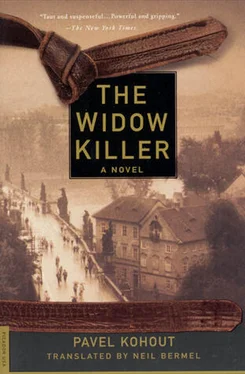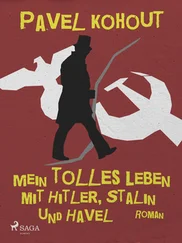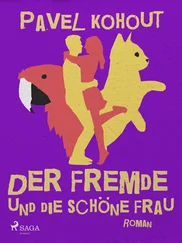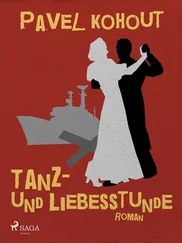The last thing Morava saw as he closed the door was Rajner’s frozen, waxy face.
He got to Sucharda in three minutes, and shortly thereafter fifteen men with carbines were jumping into the bed of a small truck driven by the garage manager, Tetera. Morava had to admit that once they had fastened their helmets beneath their chins, they looked quite imposing. He squeezed into the cabin behind Sucharda, and the vehicle pulled out of the courtyard and turned right. Through the open windows they heard dull thuds and curses; a few of the men in back must have fallen over like bowling pins.
Národni Avenue had changed. Any building not already flying Czech flags was unfurling them from the windows. For six long years under the Nazis, displaying red, white, and blue together had constituted a serious offense; where, Morava wondered, had they hidden those mountains of material? Crowds of people coursed along the sidewalks as if it were a national holiday, with tricolors in their lapels; who had made them so quickly? Groups sang; snatches of the former republic’s national anthem flew by. The truck full of armed Czech policemen was warmly greeted all along its path. The men up top were infected by the general enthusiasm and shouted back that classic Czech greeting from a generation before, when they had first shaken off the Hapsburgs.
“Nazdaaaaaaaar!”
Rypl might be waving to us too, Morava thought, but immediately turned his attention to the captain. Sucharda had been in constant telephone contact with colleagues who were unobtrusively monitoring the numbers of German guards at the radio station. At around eleven-thirty, however, a motorcycle detachment of SS forces sneaked into the courtyard so quietly that they managed to occupy the first through third floors of the building where the announcers’ offices and the technical equipment were located. Fortunately, Sucharda smirked, some clever fellow had hit on the idea of unscrewing all the directional signs and nameplates from doors, so the Germans were wandering around like Hansel and Gretel in the Black Forest.
“We’ve got to get past them and block off the broadcasting studios.”
When they turned onto Wenceslas Square it was as if they were suddenly in another time. The long, wide street was quiet and empty. They spotted the reason instantly. Starting at the intersection with Jind  i
i 
 ká Street and Vodi
ká Street and Vodi  kova Street, a half dozen firing posts zigzagged up the square toward the National Museum, each manned by a trio of Wehrmacht soldiers. One lay on the pavement gripping the handle of a heavy machine gun, the second knelt next to him with the ammunition belt, and the third stood ready to give orders to shoot.
kova Street, a half dozen firing posts zigzagged up the square toward the National Museum, each manned by a trio of Wehrmacht soldiers. One lay on the pavement gripping the handle of a heavy machine gun, the second knelt next to him with the ammunition belt, and the third stood ready to give orders to shoot.
The garage manager slowed down.
“Should I turn around?” he asked huskily.
A tense silence descended on the back of the truck.
“Sir, the rifles—”
Morava did not need to finish. Sucharda was already bawling an order through the tiny window into the truck bed.
“Hide your guns!”
A prolonged clattering noise indicated that the carbines had landed on the floor.
“Halt!”
The truck hovered in the middle of the intersection about thirty yards from the first machine gunners’ nest. Its leader, an older German lieutenant and a reservist, by the look of it, had one hand threateningly raised. The police captain nudged Morava out of the truck with his shoulder so he himself could exit, and set off toward him. He saluted as he walked and barked over his shoulder at his guide.
“Translate for me! The security division of the Czech police asks permission to proceed through to assist in defending the radio building.”
The German was tremendously nervous; they could feel his isolation, a foreigner in the heart of an enemy city. Morava added pleadingly: “Let us through, sir; we want as many people as possible to survive this war. Not just ours; yours too!”
He could see the same wish in the eyes of both young gunners, and the lieutenant seemed to sense this; it probably matched what he was hoping as well.
“Weiterfahren!” he ordered them onward a bit louder than necessary, and cupped his hands to his mouth to inform the other stations.
“Let the Czech police through!”
Sucharda waved, and the truck moved forward.
“Don’t stop!” the captain warned the garage manager. He and Morava each jumped on the cabin step and held on by the window.
“Danke, Herr Leutnant. Viel Glück!” Morava wished him.
He hoped the German wouldn’t decide to examine the truck more carefully; the small arsenal might seem provocative.
They passed the remaining gunners’ nests at a leisurely pace, so as not to provoke a panicked reaction; at any point they could have been mown down. However, Morava felt more like an officer reviewing the anxious, frightened German troops, who were clearly reluctant to throw away their lives on the brink of peace. The policemen rolled uphill past them and heard the noise of battle.
“Morava!” Sucharda shouted at him across the roof of the cabin. “Let’s try the same number again. Men!” He called to the back of the truck. “Coats off, and wrap your rifles in them; don’t let the Germans see them till they have to.”
It was a bizarre sight: Fifteen men in helmets removing their long coats and fighting centrifugal force as the truck took the curve past the museum. Behind the concrete wall above the Vinohrady tunnel a couple of crouching men gave them a warning sign, but the excitable Tetera hit the gas instead. At Sucharda’s “Stop!” he braked sharply in front of the main entrance to the radio building, which was covered in rolls of barbed wire.
“Morava, let’s go! Men, get down!”
Behind him he could hear the thuds, snorts, and wheezes of the policemen, pressing the rifles wrapped in coats to their chests; he saluted for the first time in his life at two SS men, armed to the teeth, who nearly filled the entranceway with their bodies. Had he used the correct hand? A shudder ran through him.
“Grüss Gott,” he heard himself bellow at them in a tone of voice he couldn’t stand in others. “We’re the Protectorate police reinforcements here to defend the German employees!”
Miraculously the guards stepped aside for the handful of trotting men; uniforms, even foreign ones, still had an impact, and Morava’s curt announcement had made the right impression.
The garage manager disappeared in his truck around the corner.
“Follow me!” Sucharda ordered from the front and headed across a spacious hall where Germans stood frozen in surprise, facing the staircase. “Third floor, left and to the back, where the announcers’ offices are!”
He himself stopped at the foot of the stairs and slapped his men on the backside like sheep as they ran past. One of the last ones stumbled and dropped his bundle; the carabine fell out of the man’s coat and clattered down the stairs.
A major standing right opposite Sucharda was the first to realize what had happened; he ripped his pistol from its holster.
“Scheisst doch!” he roared at the others. “Shoot! It’s an invasion!”
He fired at Sucharda at point-blank range and hit him in the forehead; the captain keeled over like a felled tree.
Jitka, Morava wondered, is this all real or is it a new dream? And if it’s real, will I see you soon in our new home? He ducked, picked up the fallen rifle, and ran after his men in a hail of bullets that buzzed past him and opened dozens of small craters in the ceiling and walls.
Читать дальше

 i
i 
 kova Street, a half dozen firing posts zigzagged up the square toward the National Museum, each manned by a trio of Wehrmacht soldiers. One lay on the pavement gripping the handle of a heavy machine gun, the second knelt next to him with the ammunition belt, and the third stood ready to give orders to shoot.
kova Street, a half dozen firing posts zigzagged up the square toward the National Museum, each manned by a trio of Wehrmacht soldiers. One lay on the pavement gripping the handle of a heavy machine gun, the second knelt next to him with the ammunition belt, and the third stood ready to give orders to shoot.










